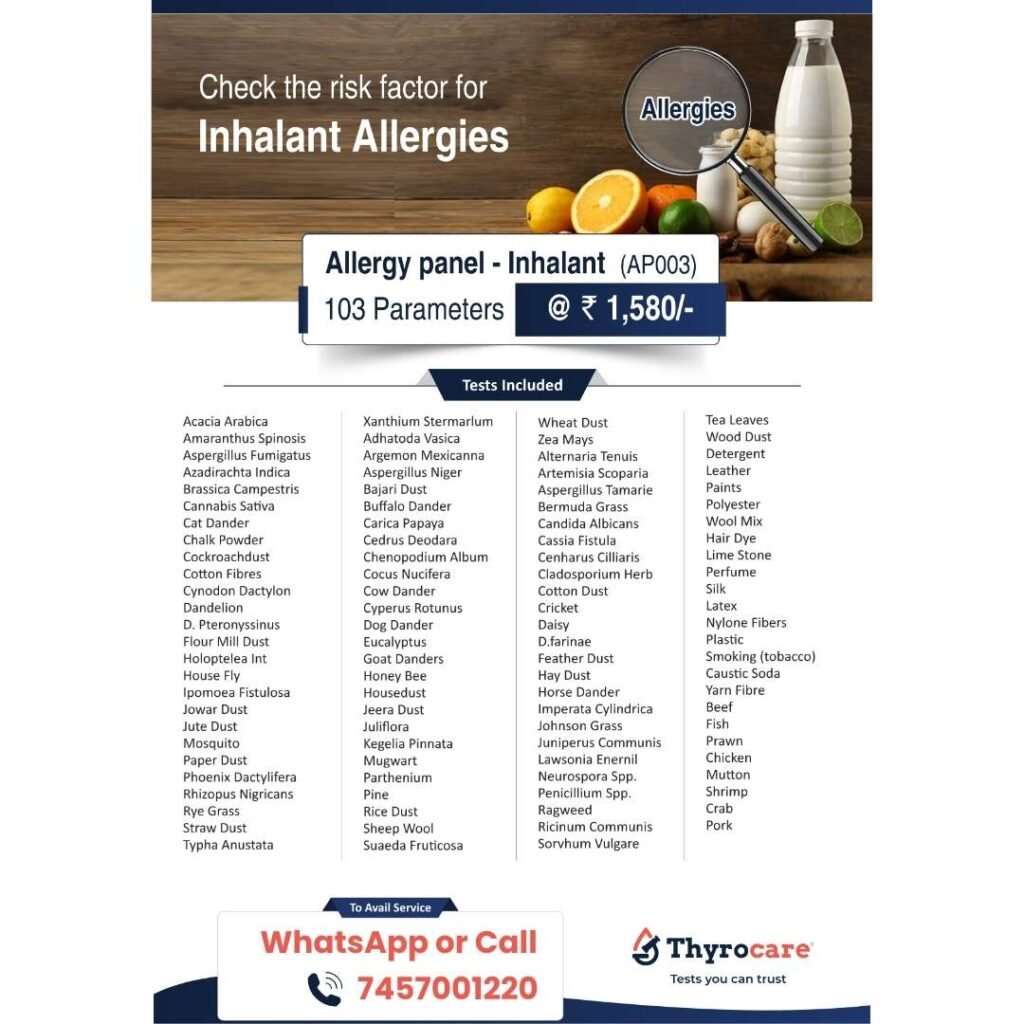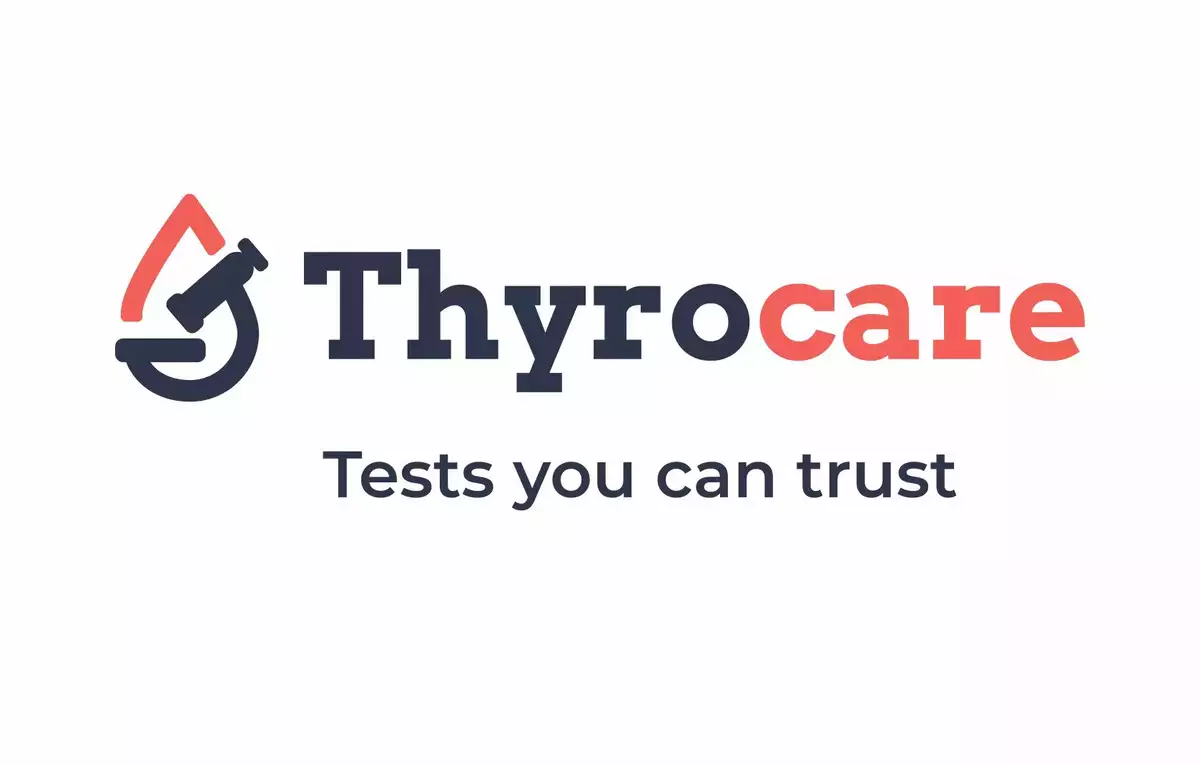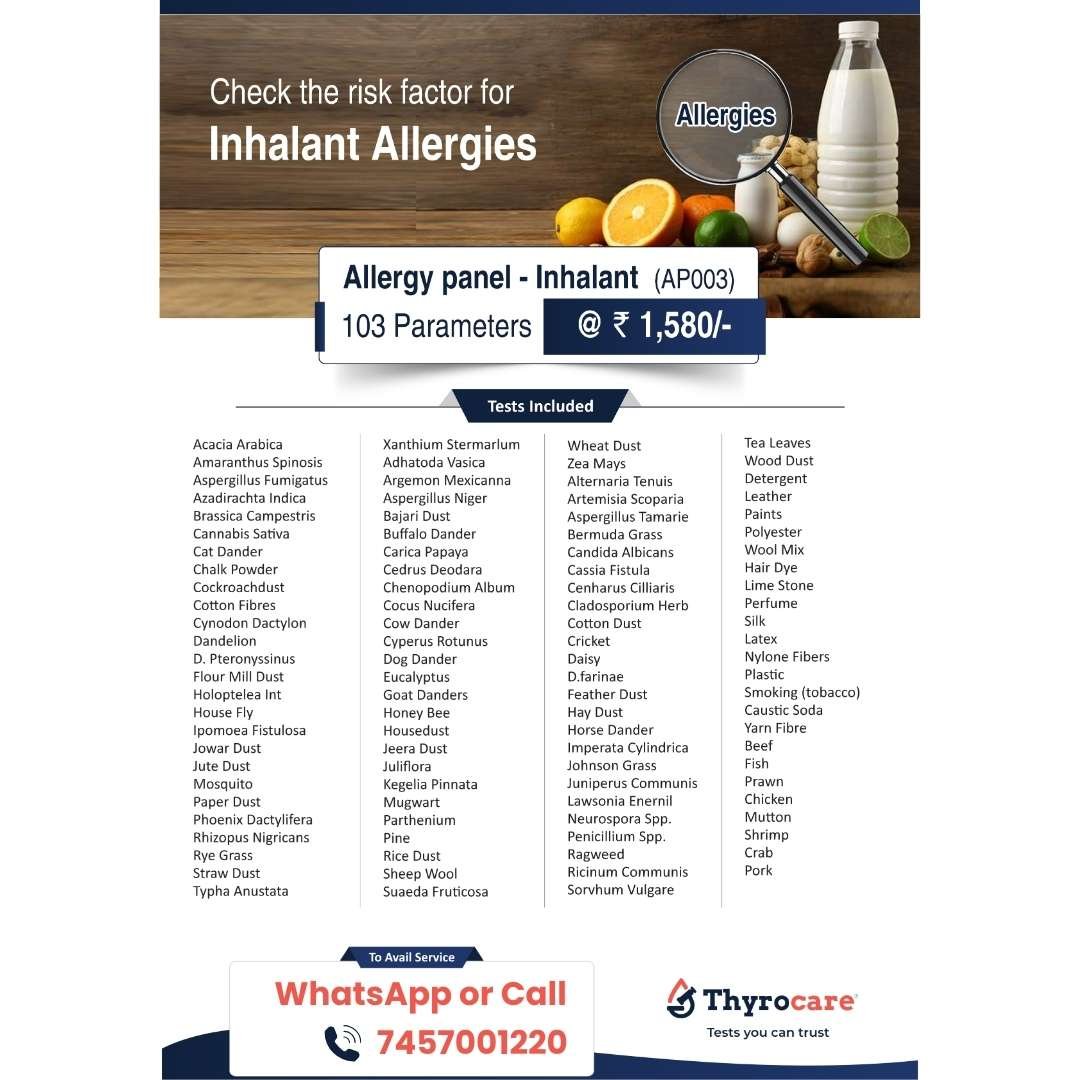Allergies are an increasing concern worldwide, affecting millions of individuals across various age groups. Among the different types of allergies, inhalant allergies are particularly prevalent and can significantly impact quality of life. This blog will explore the Inhalant Allergy Panel (AP003), which tests for 103 parameters associated with inhalant allergens, helping individuals assess their risk factor for allergies.
Get CashBack Book Your Tests On WhatsApp +917457001220

Inhalant allergens are substances that can be inhaled and cause allergic reactions. These include various types of pollen, mold spores, animal dander, dust mites, and other environmental factors. Understanding these allergens is crucial for identifying triggers and managing allergic reactions effectively.
Get CashBack Book Your Tests On WhatsApp +917457001220
What is the Inhalant Allergy Panel (AP003)?
The Inhalant Allergy Panel (AP003) is a comprehensive test designed to identify sensitivities to a wide range of inhalant allergens. With a price of ₹1,580, this test includes an analysis of 103 parameters, making it one of the most thorough panels available.
Parameters Included in the Inhalant Allergy Panel (AP003)
| Allergen | Common Source |
|---|---|
| Acacia Arabica | Gum Arabic, Trees |
| Aspergillus Funigatus | Molds, Fungi |
| Azadirachta Indica | Neem Tree |
| Grass (Poa Annua) | Common Lawn Grass |
| Cannabis | Hemp Plant |
| Cat Dander | Domestic Cats |
| Cockroach Allergen | Household Pests |
| Cotton Fibers | Textiles |
| Dust Mites | House Dust |
| Phoenix Dactylifera | Date Palm |
| Rhizopus Nigricans | Molds |
| Straw | Agricultural Waste |
| Typha Anostata | Cattail |
| Adhatoda Vasica | Medicinal Plant |
| Aspergillus Niger | Molds |
| Hair (Human) | Human Hair |
| Buffalo Dander | Domestic Buffalo |
| Carica Papaya | Papaya Plant |
| Cedrus (Cedar) | Cedar Trees |
| Cladosporium Humicola | Molds |
| Cocos Nucifera (Coconut) | Coconut Palm |
| Cryphonectria Parasitica | Molds |
| Cyperus Rotundus | Nutsedge |
| Dog Dander | Domestic Dogs |
| Gossypium (Cotton) | Cotton Plant |
| Jeera (Cumin) | Spice Plant |
| Juniperus | Juniper Trees |
| Keerai (Amaranth) | Leafy Greens |
| Musa (Banana) | Banana Plant |
| Parthenium | Weeds |
| Rice Dust | Rice Production |
| Sheep Wool | Sheep Farming |
| Suaeda | Saltwort |
| Wheat | Cereal Grain |
| Maize | Cereal Grain |
| Artemisia Scoparia | Wormwood |
| Aspergillus Tamarii | Molds |
| Bermuda Grass | Turf Grass |
| Cassia Fistula | Yellow Cassia |
| Centaurus Ciliaris | Weeds |
| Cladosporium Herb | Molds |
| Common Dust | Environmental Allergen |
| Imperata Cylindrica | Cogongrass |
| Johnson Grass | Weeds |
| Lamaria Enemil | Aquatic Plant |
| Neurospora Species | Molds |
| Penicillium Species | Molds |
| Ricinus Communis (Castor Bean) | Castor Bean Plant |
| Sorghum Vulgare | Grain Plant |
| Tea Leaves | Tea Plant |
| Wood Dust | Wood Processing |
| Dander | Animal Skin |
| Leather | Animal Hide |
| Wool | Sheep Fiber |
| Household Products | Perfume, Cleaning Agents |
| Cigarette Smoke | Tobacco Products |
| Caustic Soda | Chemical Products |
| Fiber | Various Sources |
| Fish | Seafood |
| Murtum | Local Flora |
Get CashBack Book Your Tests On WhatsApp +917457001220
Importance of Allergy Testing
Testing for inhalant allergies is crucial for several reasons:
- Identifying Triggers: Knowing which allergens trigger your symptoms can help you avoid them and manage your allergies more effectively.
- Personalized Treatment: Results from the allergy panel can guide treatment options, including medications and immunotherapy.
- Improving Quality of Life: By avoiding allergens and managing symptoms, individuals can improve their overall well-being and daily functioning.
List of Common Inhalant Allergens
Grass Pollen
- Sources: Common types include Bermuda Grass, Johnson Grass, and Timothy Grass.
- Symptoms: Sneezing, nasal congestion, and itchy eyes.
Mold Spores
- Sources: Aspergillus, Cladosporium, and Penicillium.
- Symptoms: Coughing, wheezing, and skin rashes.
Animal Dander
- Sources: Cats, dogs, and other pets.
- Symptoms: Runny nose, itchy eyes, and skin reactions.
Dust Mites
- Sources: House dust, bedding, and upholstery.
- Symptoms: Nasal congestion, sneezing, and asthma.
Other Common Allergens
- Cigarette Smoke: Irritation of the respiratory system.
- Perfume: Headaches, dizziness, and respiratory issues.
- Household Products: Skin irritation and respiratory problems.
Tips for Managing Inhalant Allergies
- Avoidance: Identify and avoid known allergens.
- Maintain Cleanliness: Regularly clean living spaces to reduce dust and mold.
- Use Air Purifiers: Invest in high-quality air purifiers to filter out allergens.
- Stay Hydrated: Drink plenty of water to help thin mucus and reduce congestion.
- Medication: Consult a healthcare professional for appropriate allergy medications.
- Immunotherapy: Consider allergy shots or sublingual tablets for long-term relief.
Get CashBack Book Your Tests On WhatsApp +917457001220
Frequently Asked Questions (FAQs)
What are inhalant allergies?
Inhalant allergies are allergic reactions caused by substances in the air that are inhaled, leading to symptoms like sneezing, coughing, and wheezing.
How does the Inhalant Allergy Panel work?
The Inhalant Allergy Panel tests your blood for antibodies to specific allergens. A positive result indicates sensitivity to those allergens.
What are common symptoms of inhalant allergies?
Common symptoms include sneezing, runny nose, itchy eyes, coughing, and asthma-like symptoms.
How often should I get tested for allergies?
It is advisable to get tested every 1-2 years, or as recommended by your healthcare provider, especially if you experience worsening allergy symptoms.
Can inhalant allergies be cured?
While there is no cure, symptoms can be managed effectively through avoidance strategies, medications, and immunotherapy.
Conclusion
Understanding inhalant allergies is essential for managing symptoms and improving quality of life. The Inhalant Allergy Panel (AP003) offers a comprehensive analysis of various allergens, enabling individuals to take proactive steps toward better health. By staying informed and following effective management strategies, those with inhalant allergies can lead fulfilling lives.
To avail the Inhalant Allergy Panel (AP003), reach out to Thyrocare at WhatsApp or Call: 7457001220. Remember, you can trust Thyrocare for reliable and accurate allergy testing!
Featured Snippet
Inhalant Allergy Panel (AP003) at ₹1,580 tests for 103 allergens, including grass pollen, mold spores, animal dander, and dust mites. Identify your triggers and manage your allergies effectively. Call 7457001220 for more information!
Get CashBack Book Your Tests On WhatsApp +917457001220
FAQs
1. What are inhalant allergies?
Answer: Inhalant allergies are allergic reactions triggered by substances in the air that are inhaled, such as pollen, mold spores, animal dander, and dust mites.
2. How do I know if I have inhalant allergies?
Answer: Common symptoms include sneezing, runny or stuffy nose, itchy or watery eyes, coughing, and wheezing. Consulting a healthcare provider and undergoing allergy testing can confirm the diagnosis.
3. What is the Inhalant Allergy Panel (AP003)?
Answer: The Inhalant Allergy Panel (AP003) is a comprehensive allergy test that screens for sensitivities to 103 inhalant allergens, helping to identify potential triggers.
4. How much does the Inhalant Allergy Panel (AP003) cost?
Answer: The test costs ₹1,580 and includes an analysis of various common inhalant allergens.
5. What types of allergens are tested in the panel?
Answer: The panel tests for various allergens, including pollen from grasses, trees, and weeds; mold spores; dust mites; and dander from pets like cats and dogs.
6. How is the Inhalant Allergy Panel conducted?
Answer: The panel typically involves a blood test that measures the level of specific antibodies (IgE) produced in response to allergens.
7. How long does it take to get the results?
Answer: Results from the Inhalant Allergy Panel are usually available within a few days, depending on the laboratory processing time.
8. Can inhalant allergies be cured?
Answer: There is no cure for inhalant allergies, but symptoms can be managed effectively through avoidance strategies, medications, and immunotherapy.
9. What should I do if I have a positive test result?
Answer: Consult with your healthcare provider to discuss the results and develop an appropriate management plan tailored to your specific allergens.
10. Are inhalant allergies common?
Answer: Yes, inhalant allergies are very common and can affect individuals of all ages. They are particularly prevalent during certain seasons, depending on pollen levels.
11. What are the most common inhalant allergens?
Answer: The most common inhalant allergens include pollen from grasses, trees, and weeds, as well as mold spores, dust mites, and animal dander.
12. How can I reduce exposure to inhalant allergens?
Answer: To reduce exposure, keep windows closed during high pollen seasons, use air purifiers, regularly clean your home, and avoid outdoor activities when pollen counts are high.
13. What medications are available for managing inhalant allergies?
Answer: Common medications include antihistamines, decongestants, nasal corticosteroids, and leukotriene receptor antagonists. Always consult a healthcare provider before starting any medication.
14. What is immunotherapy for inhalant allergies?
Answer: Immunotherapy involves exposing patients to gradually increasing doses of allergens to build tolerance over time, often administered through allergy shots or sublingual tablets.
15. Can children have inhalant allergies?
Answer: Yes, children can develop inhalant allergies, and symptoms may appear as early as infancy. It’s essential to consult a pediatrician if allergies are suspected.
16. What lifestyle changes can help manage inhalant allergies?
Answer: Lifestyle changes such as maintaining a clean living environment, using hypoallergenic bedding, and avoiding smoking can help reduce allergy symptoms.
17. Are there any natural remedies for inhalant allergies?
Answer: Some individuals find relief with natural remedies like saline nasal rinses, local honey (for pollen allergies), and dietary supplements like omega-3 fatty acids. However, consult a healthcare provider before trying these.
18. How can I differentiate between a cold and inhalant allergies?
Answer: Allergies usually cause itchy eyes, sneezing, and clear nasal discharge, while colds often come with a sore throat, cough, and colored mucus. If symptoms persist, consult a healthcare provider.
19. Can food allergies cause respiratory symptoms?
Answer: While food allergies primarily cause gastrointestinal and skin reactions, they can occasionally trigger respiratory symptoms, especially in individuals with asthma.
20. How often should I get tested for inhalant allergies?
Answer: It is advisable to get tested every 1-2 years or as recommended by your healthcare provider, especially if you experience worsening allergy symptoms.

